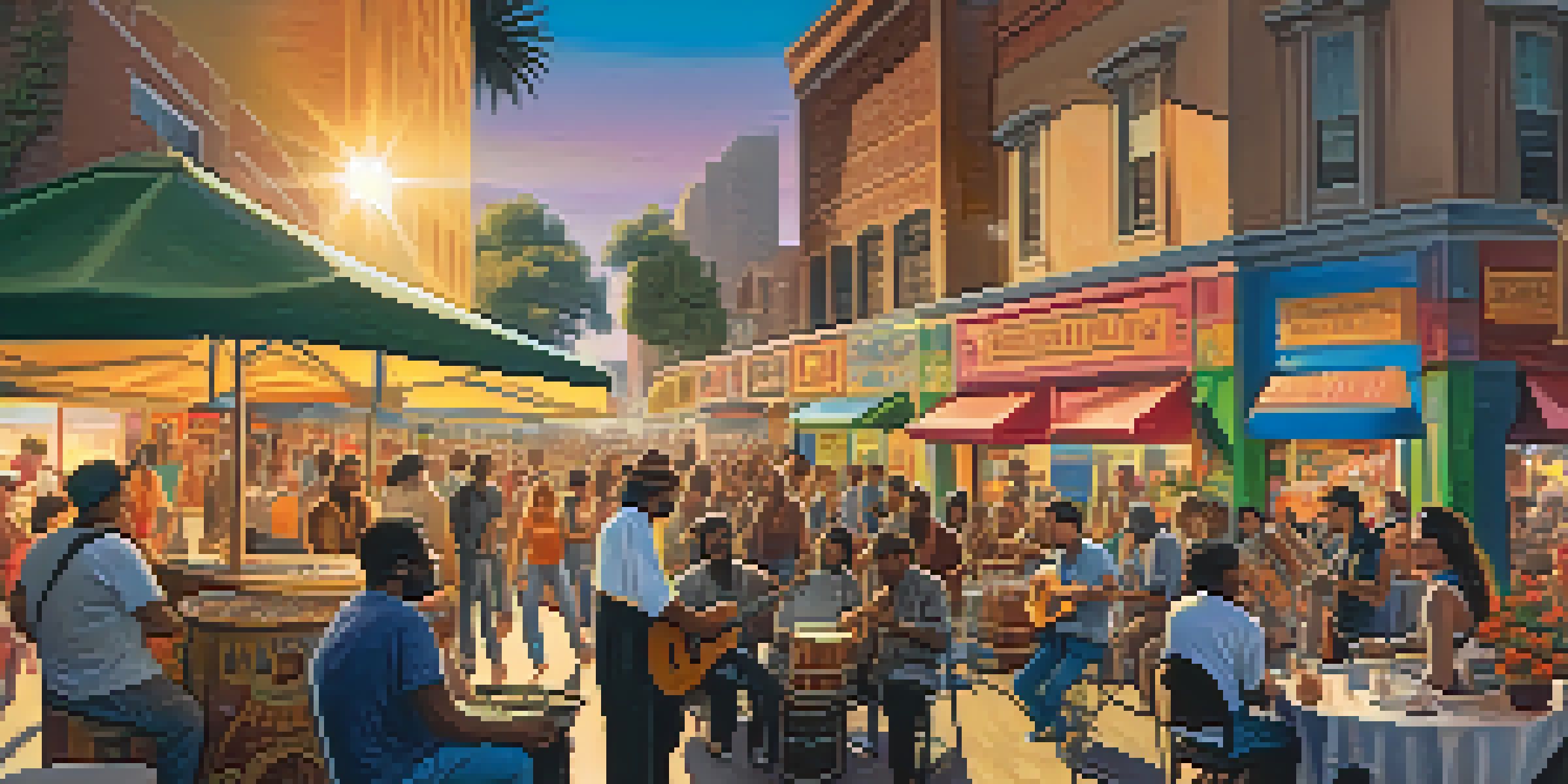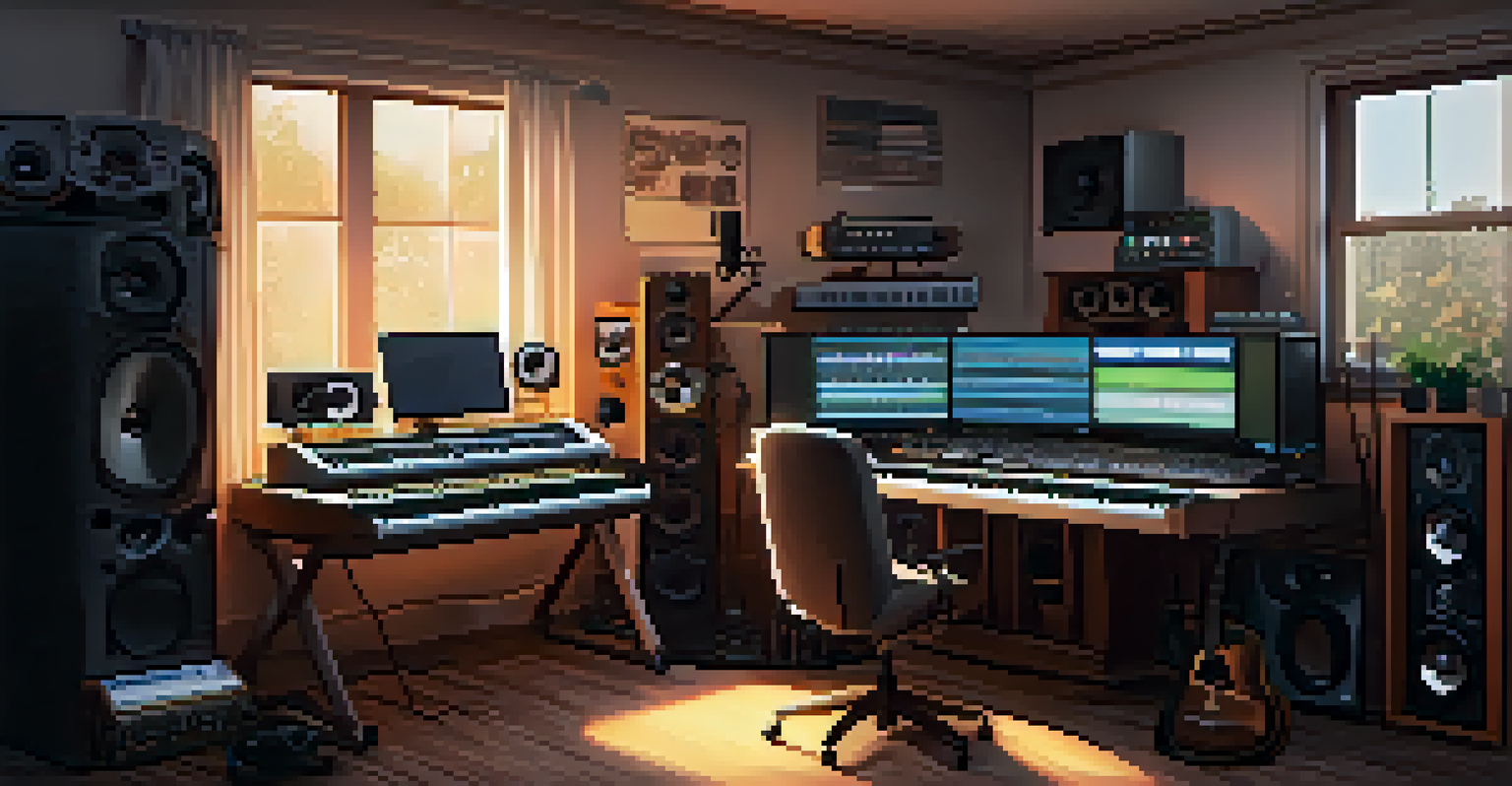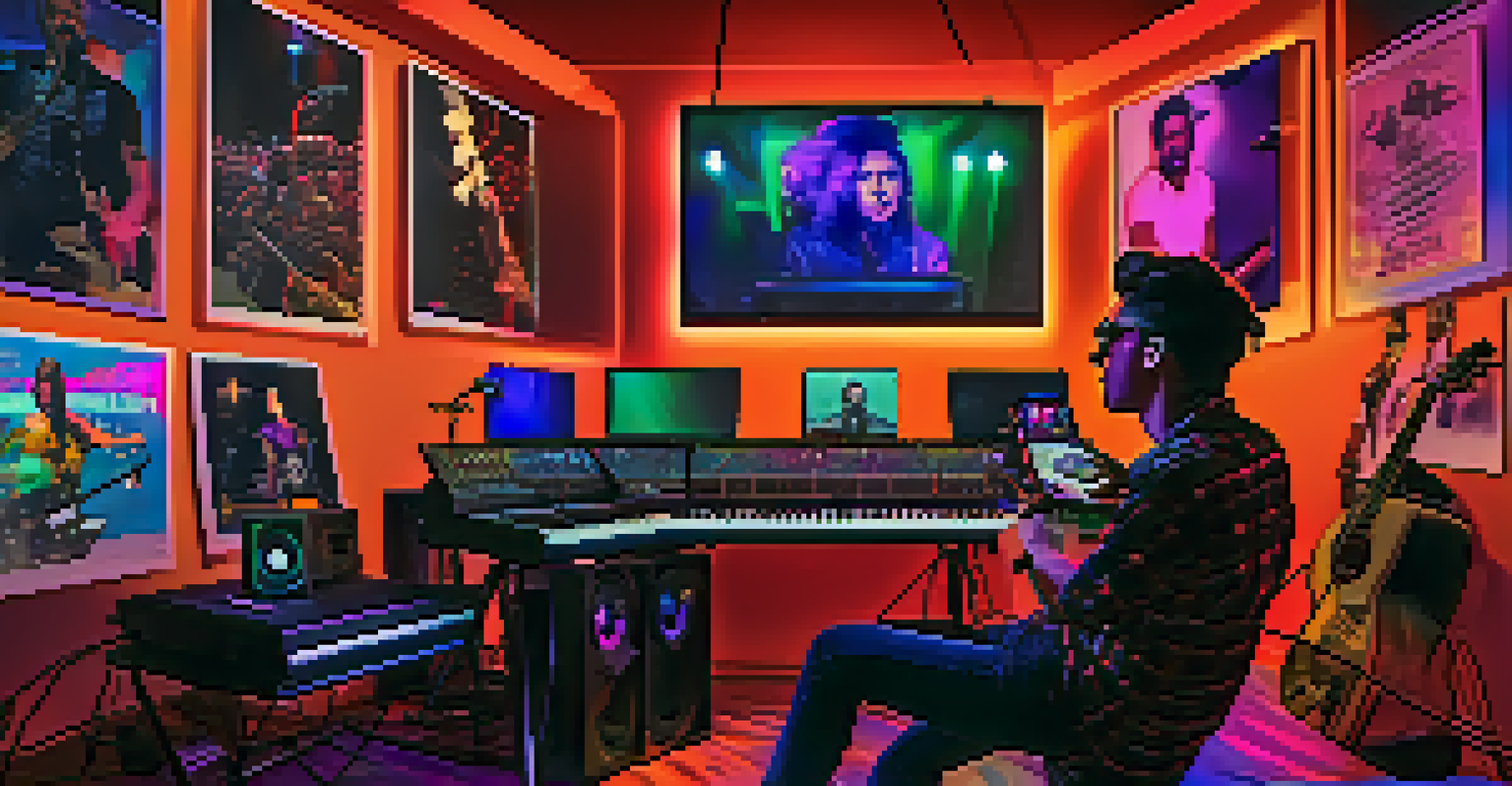The Impact of Technology on California's Music Landscape

The Rise of Digital Music Platforms in California
In recent years, digital music platforms like Spotify and Apple Music have transformed how artists distribute their work. These platforms allow musicians from all corners of California to reach audiences without the need for traditional record labels. This democratization of music distribution means that independent artists can gain traction and build a fanbase from the comfort of their homes.
Music is the shorthand of emotion.
Moreover, these platforms offer sophisticated algorithms that recommend music tailored to listeners’ tastes, enhancing discovery for both artists and fans. For example, a small indie band from San Diego can find themselves featured on curated playlists, potentially skyrocketing their popularity overnight. This has created an environment where niche genres can flourish alongside mainstream hits.
However, the ease of access also brings challenges. Many artists struggle to earn a sustainable income from streaming alone, as the revenue per stream can be minimal. As a result, musicians are increasingly exploring alternative revenue streams like live performances and merchandise sales to support their careers.
Social Media: A Game Changer for Music Promotion
Social media platforms such as Instagram, TikTok, and Twitter have become essential tools for musicians in California to promote their work. Artists can share snippets of their songs, behind-the-scenes content, and engage with fans directly, creating a personal connection that resonates with audiences. For instance, many emerging artists have found viral success on TikTok, leading to increased streams and concert ticket sales.

Additionally, social media enables musicians to collaborate across genres and geographical boundaries. A rapper from Los Angeles can easily team up with a folk singer from San Francisco, blending their styles and reaching diverse audiences. This cross-pollination of genres enriches the California music landscape, making it more dynamic and innovative.
Digital Platforms Empower Musicians
California's digital music platforms enable independent artists to distribute their work directly to listeners, fostering a more inclusive music landscape.
However, the pressure to maintain a constant online presence can be overwhelming for many artists. Balancing creative work with the demands of social media can lead to burnout, prompting some musicians to rethink their approach to promotion and audience engagement.
The Role of Music Production Technology
Advancements in music production technology have drastically altered how music is created in California. With affordable software and hardware, aspiring producers can craft professional-quality tracks from home studios. This accessibility has led to a surge of creativity, as artists experiment with sounds and styles that were once limited to high-budget studios.
Technology is best when it brings people together.
For example, the rise of digital audio workstations (DAWs) like Ableton Live and Logic Pro has empowered musicians to take control of their production process. Artists can layer instruments, apply effects, and fine-tune their tracks without needing extensive technical knowledge. This not only streamlines the production process but also fosters a DIY mentality among California's music creators.
Nevertheless, the abundance of tools can sometimes lead to an overwhelming amount of choices. Artists may find themselves caught in a loop of perfectionism, constantly tweaking their tracks rather than releasing music. Striking a balance between innovation and completion is crucial for navigating this landscape.
Live Streaming and Virtual Concerts: A New Normal
The COVID-19 pandemic catalyzed a shift towards live streaming and virtual concerts, which have become integral to California's music scene. Artists, unable to perform in traditional venues, turned to platforms like Twitch and Instagram Live to connect with fans. This not only kept the music alive during challenging times but also reached audiences far beyond local venues.
Virtual concerts have allowed artists to experiment with formats and interactive experiences. Some musicians have incorporated augmented reality and immersive visuals to enhance the online concert experience, making it feel more like an event rather than just a performance. This innovation has opened up new possibilities for audience engagement and monetization.
Social Media Drives Music Promotion
Social media has become a vital tool for musicians in California, allowing them to engage with fans and collaborate across genres to enhance their visibility.
However, the novelty of virtual concerts can wear off, and many artists are now navigating the challenge of transitioning back to live performances. As restrictions lift, there's a balancing act between maintaining the benefits of virtual engagement and the irreplaceable energy of live shows.
The Impact of Artificial Intelligence on Music Creation
Artificial intelligence (AI) is making waves in the music industry, influencing everything from composition to marketing. AI tools can analyze vast amounts of data to identify trends, helping artists create music that resonates with listeners. For instance, some California artists are using AI to generate melodies or assist in lyric writing, leading to unique collaborations between humans and machines.
These technological advancements can also optimize marketing strategies by predicting listener preferences and behaviors. By leveraging AI insights, artists can tailor their promotional efforts, ensuring their music reaches the right audience. This data-driven approach can be particularly beneficial for independent musicians seeking to maximize their impact.
However, the reliance on AI raises questions about authenticity and creativity. While AI can assist in the creative process, some argue that it may dilute the personal touch that makes music special. Striking a balance between leveraging technology and preserving artistic integrity is an ongoing conversation in California's music community.
The Cultural Influence of Technology on Music Genres
Technology has not only changed how music is produced and consumed but also influenced the evolution of genres within California's diverse music scene. Genres like electronic dance music (EDM) and lo-fi hip hop owe much of their popularity to digital tools and online platforms that allow for easy distribution and collaboration. These genres have gained significant traction among younger audiences, driving new trends.
Moreover, technology facilitates the fusion of genres, leading to innovative sounds that reflect the multicultural tapestry of California. For example, artists often blend traditional elements from various cultures with modern production techniques, creating unique musical experiences. This cross-genre experimentation enriches the overall music landscape and attracts diverse audiences.
Tech Shapes Music Creation and Genres
Advancements in technology, from production tools to AI, are reshaping how music is created and consumed, influencing the evolution of diverse genres in California.
However, as genres evolve, some purists express concerns about the dilution of traditional sounds. Balancing innovation with respect for musical heritage is essential for maintaining the depth and richness of California's musical identity.
The Future of California's Music Industry in a Tech-Driven World
As technology continues to evolve, so too will California's music industry. With emerging trends like virtual reality concerts and AI-generated music, the possibilities are endless. Artists, producers, and fans alike will need to adapt to these changes, embracing new tools while staying true to their artistic vision.
Moreover, the ongoing impact of technology on music consumption will shape how artists connect with their audiences. For instance, the rise of NFTs and blockchain technology is opening new avenues for artists to monetize their work and engage with fans in innovative ways. This shift could lead to a more sustainable model for musicians in the digital age.

Ultimately, the future of California's music landscape will depend on the ability of artists to harness technology while maintaining the soul of their craft. As they navigate this ever-changing environment, the resilience and creativity of California's musicians will continue to shine through.